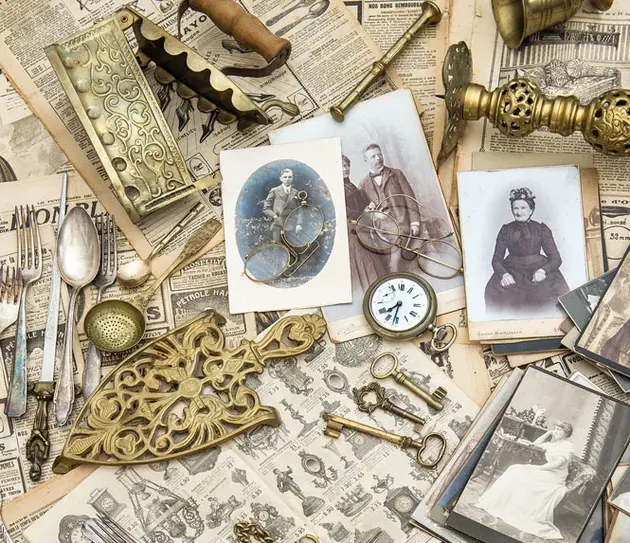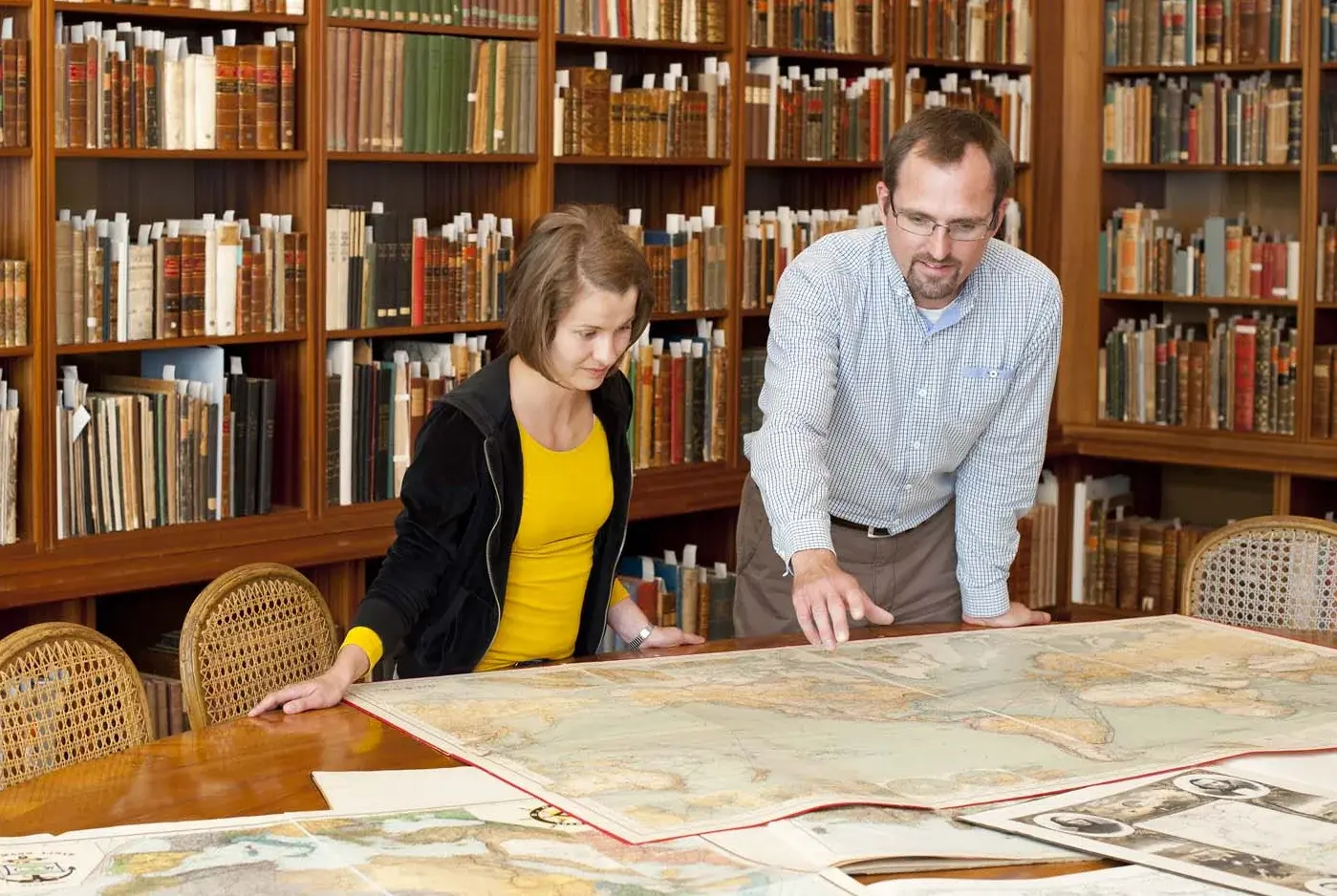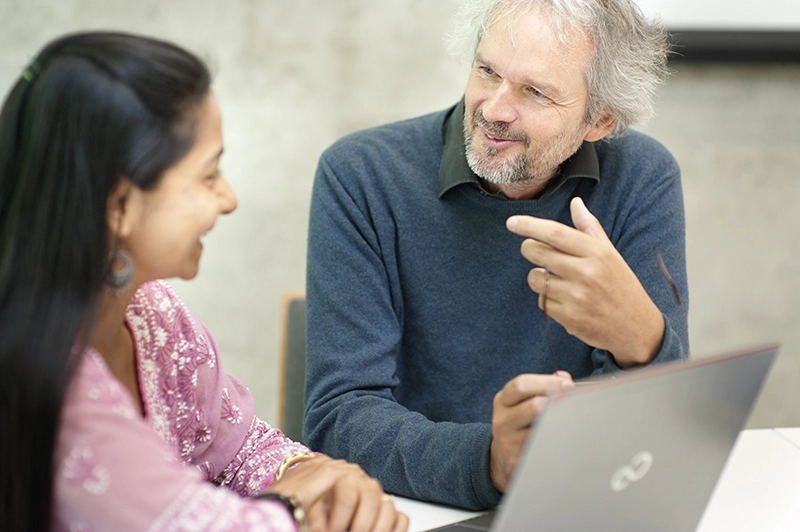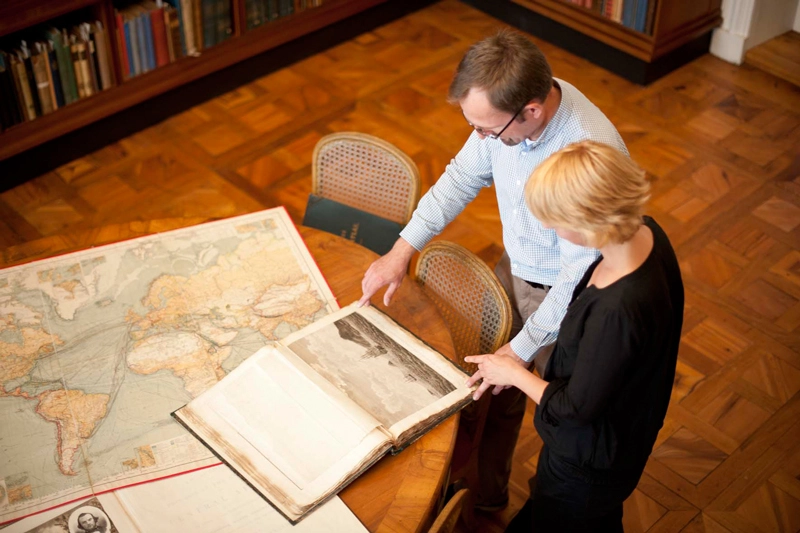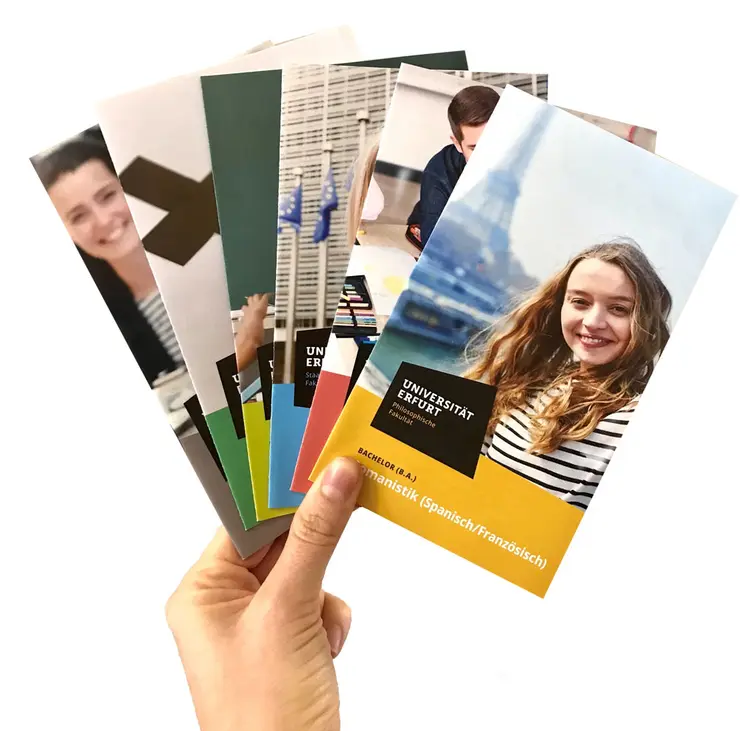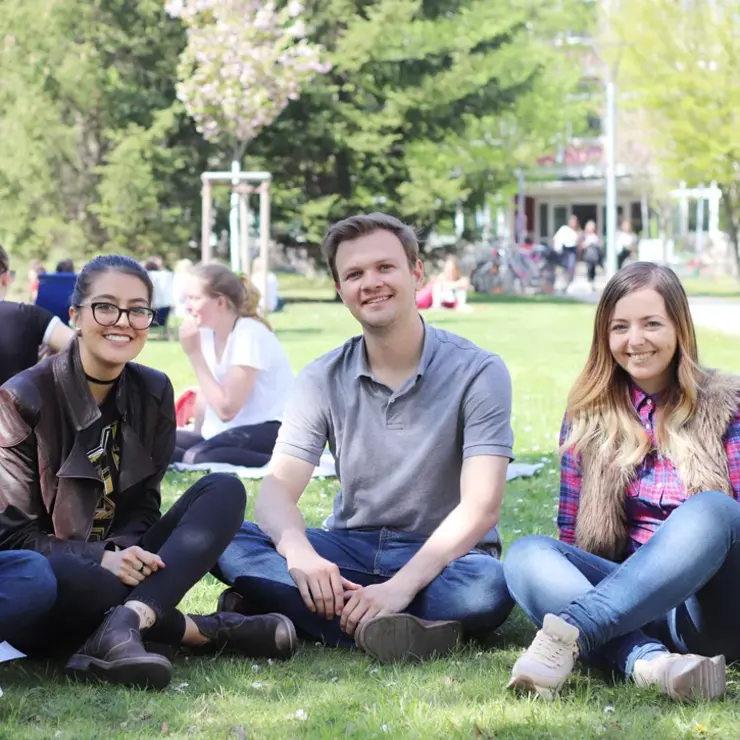Collections-Based History of Knowledge and Culture (phased out)
Due to a reform process in the Faculty of Philosophy, the degree programme " Collection-based History of Knowledge and Culture" will no longer be offered as an independent degree programme from the winter semester 2024/25. As a transitional measure, however, interested students will be able to focus their studies on collection studies from the winter semester 2024/25 under the current provisions of the Master's programme "History transcultural".
Course Details
The Master's program Collection-Related History of Knowledge and Culture is an interdisciplinary and interdepartmental M.A. program dedicated to collecting as cultural practice. The program is designed to enable students to carry out collection-related research in particular, but also to prepare them for academic work in collections, e.g. in museums, libraries or archives, as well as in projects for cataloguing and mediating collections with digital media. University teaching of the history, theory and practice of collecting and the knowledge spaces associated with it will be linked to different types of collections.
Due to its focus on the collections in Erfurt and Gotha, the Master's programme offers the opportunity to study both the genesis and development of collections and the specifics of individual collection types in an interdisciplinary and cross-faculty manner.
The collections to be included in the course of study are focused on the history of art, nature, books and culture; in addition, there are also collections on the history of technology. They cover prehistoric as well as historical periods in great density and diversity and combine exceptional and prototypical artificalia and naturalia of European and non-European cultural, natural, knowledge and science history.
The Master's program is characterised by its methodological orientation, research relevance, teaching with regional collections or their objects and by the involvement of staff from institutions with a collection focus.
Overview of our collections
Gotha Research Library
The Gotha Research Library (University of Erfurt) emerged from the court and private libraries of the dukes of Gotha. Today it is one of the four large German libraries with old collections. With approximately 400,000 old prints from the 16th to 19th century, almost 10,000 occidental manuscripts and 3,500 oriental manuscripts, it comprises the written and printed tradition from the 8th to the 19th century. In the encyclopaedic breadth of its manuscript and book holdings, the library is prototypical of the courtly culture of knowledge and scholarship between the Renaissance and Enlightenment.
In addition to the special collections of more than 11,000 emigrant letters, 130 bequests, 1,400 musical works and prints, the representative holdings of manuscripts, bequests and autographs are particularly noteworthy. The research library is one of the most important international collection centres for the cultural history of Protestantism.
Gotha Perthes Collection
The collection Perthes Gotha (Research Library Gotha of the University of Erfurt) was acquired by the Free State of Thuringia in 2003 with the support of the Cultural Foundation of the States and integrated into the Research Library Gotha. The collection comprises 185,000 maps, about 3,500 school wall maps, 120,000 volumes of a publishing library, 800 linear metres of archival materials, 1,650 copper plates and a picture archive.
The eponymous company, the Justus Perthes Verlag Gotha, was one of the internationally dominant protagonists in the collection, evaluation and dissemination of geographic knowledge. Its collections represent a unique archive of research into the discovery and mapping of the earth in the 19th and 20th centuries. They hand down a unique fund of information on European publishing and book trade history, economic and technical history, scientific, cultural and pictorial history from the Enlightenment to the end of the 20th century.
Bibliotheca Amploniana
Today, the Bibliotheca Amploniana is considered the largest collection of a late medieval scholar's work still largely intact. In 1412 Amplonius Rating (1363/65 - 1435) from Rheinberg on the Lower Rhine donated what was then a very large number of 633 manuscript volumes to the Collegium Amplonianum at the old University of Erfurt, which he also founded. As a result of later growth, the Amploniana today contains 979 manuscript volumes and about 1800 printed works of the early modern period.
The collection focuses on the fields of theology, philosophy and medicine. The oldest manuscripts date from the first millennium of our time. The development of medieval medicine or the reception of Aristotle can be traced here through extraordinary and unique textual evidence. Especially for the period from the 12th to the 15th century, the collection provides a deep insight into the late medieval culture of knowledge and scholarship. In addition to the Amploniana in the narrower sense, the so-called Depositum Erfurt also includes more than 40,000 prints from the years 1500 - 1800, including the libraries of the two Electoral Mainz governors of Erfurt Philipp Wilhelm von Boineburg and Carl Theodor von Dalberg as well as book collections of the dissolved Erfurt monasteries.
Collection Teufel
The Teufel Collection with its collection areas of history, Judaica, Bohemica, Bavarica, literature, art and music, but also humour, was donated to the University of Erfurt by Dr. Helmut Teufel and his wife Helena Teufel in December 1997. At that time, the scientific library contained about 50,000 volumes.
The University also received the media which the couple would acquire in the future. A comparable collection can hardly be put together by purchase; it includes, for example, the manuscripts of the composer Otto Fiebach, literature in Czech, but also publications of numerous writers from Bohemia and Moravia.
Overview of external collections
Art Collections
The art collections of the Friedenstein Castle Foundation originate mainly from the Kunstkammer founded by Duke Ernst I of Sachsen-Gotha-Altenburg (1601 - 1675) and are presented in the historical rooms of the castle and in the Ducal Museum.
They mainly comprise old German and Dutch paintings as well as a collection of engravings (50,000 titles) with works by Albrecht Dürer, Martin Schongauer and Lucas Cranach, among others, and an extensive collection of leaflets (900 titles) from the Reformation period. In addition, there is a sculpture collection with sculptures from the Middle Ages and Classicism, an extensive coin collection (150,000 coins and medals), a ceramics collection from antiquity to the present, and special collections (Egyptian collection, ethnological collection, textiles).
Natural history collections
The natural history collections of the Friedenstein Castle Foundation also originate from the ducal art chamber holdings and represent one of the oldest collections of their kind in Germany and the largest in Thuringia. More than 300 year old pieces from the early days of the Ducal Art and Natural History Cabinet are among the most valuable objects in the collection today. The Gotha Kunstkammer holdings provide authentic evidence of the universal historical endeavours of the late Renaissance. The holdings include fossils (primeval dinosaurs), a historical collection of conchylia and minerals, a collection of insects, animal preparations (including those relating to the animal world of the Antarctic) and evidence of the biodiversity of the Thuringian Forest since the 19th century.
Historical Museum
The Historical Museum of the Friedenstein Castle Foundation (previously Museum of Regional History and Folklore) preserves and expands an extensive collection on the history and culture of the Gotha region. It is one of the most important cultural-historical collections in Thuringia with individual exhibits of international standing.
The Historical Museum was founded in 1928 by the Verein für Gothaische Geschichte und Altertumsforschung. It was given its domicile in the west tower of Friedenstein Castle and, in addition to its collection of paintings and arts and crafts, has a cartographic collection (especially with outstanding evidence of map production in the 19th / 20th century), a collection of musical instruments and historical photographs.
Thuringian State Archive Gotha
The Thuringian State Archives Gotha, as an institution directly subordinated to the state of Thuringia today, grew out of the Secret Archives of the Dukes of Gotha, founded after 1640/41. After the foundation of the Saxon-Ernestine Duchy of Gotha, documents, official books and files were taken over from the Community Main Archive of the Saxony-Ernestine General House in Weimar.
The Secret Archives were essentially the registry of the Privy Council, the supreme government authority of the duchy. In its historical core, the archive comprises the administrative documents of the Duchy and the Thuringian state authorities that succeeded it since 1920 as well as the secularised medieval ecclesiastical institutions in the area of the Duchy. The archive preserves central evidence of the acquisition and collection policy of the dukes of Gotha and the establishment and expansion of the ducal collections at Friedenstein Castle.
Job & Career Perspectives
Our graduates work in the following professional fields:
- in science and research,
- in museums,
- in digitisation projects.
Collections-Based History of Knowledge and Culture in Detail
Structure of the study program
The Master's programme Collection-Related History of Knowledge and Culture is completed in a three-semester study phase (90 LP) in five of the nine following modules, each with 18 credits. The modules consist of two, three or four courses each with three, six or nine credit points.
The modules are divided into a compulsory area and an optional area. The module M 01 must be taken in the first year of study. In the elective compulsory area, module M 04 or module M 05 must be taken. A second elective compulsory module can be chosen freely, provided that no module is taken twice. The elective compulsory area enables a specialisation on certain collections and collection types on a structural level.
In the fourth semester a Master's thesis (30 LP) is written.
Mandatory modules:
- M 01 History, theory and practice of collecting (18 LP)
- M 02 Propaedeutics (18 LP)
- M 03 Internship (18 LP)
Elective modules:
- M 04 Cartography and global history (18 LP)
- M 05 History of knowledge and science (18 LP)
- M 15 Knowledge rooms (18 LP)
- M 16 History and Theory of Art / Philosophy (18 LP)
- M 17 History and Theology of Medieval and Early Modern Christianity (18 LP)
- M 18 Constitutional and Administrative Science (18 LP)
Ideally, module 18 should be occupied in the following order:
- WiSe: State Organizational Law and Practical Exercise in Archives
- SoSe: Historical foundations of law
- WiSe: General administrative law
Internship in a collection
The internship is an interface between the university and the working world. It serves the purpose of combining theory with professional practice and is recommended for the 3rd semester. The internship takes place in one or more collections. It is chosen by the student him/herself, agreed with a supervisor before the internship period and confirmed by the internship institution after the internship period.
Possible internship institutions:
Thuringian State Archive Gotha
Friedenstein Castle Foundation
Saalfeld town museum in the Franciscan monastery
City Archive and Museum Ehrenstein Castle Ohrdruf
Digitisation team of the Museum Association of Thuringia e.V.
Leibniz Institute for Regional Geography
Leipzig University Library: Manuscript Centre
State Office for Surveying and Geoinformation Thuringia
Museum landscape Hessen Kassel
...and many more
Study abroad
A study semester abroad is highly recommended. The International Office is happy to assist in organizing the stay abroad.
Admissions qualification
- an above-average degree from a relevant university course such as History of Science, History of Medicine, Pharmacy, Philosophy, Theology, History, Literature, Religious Studies, Natural Sciences, Book Studies, Art and Cultural Studies of at least six semesters standard period of study,
- successful participation in a selection procedure
General admission requirements:
Selection process
At the first stage of the selection process, a selection committee evaluates the student's professional motivation as well as the necessary previous academic achievements. As a preliminary study achievement, knowledge of historical-critical/cultural-scientific methods to the extent of 12 ECTS must be demonstrated, which is usually covered by courses in the subjects of the first degree.
In the second part of the selection procedure, the result of a selection interview and the Bachelor's final grade count. Applicants have passed the selection procedure if they achieve a total score of 60 or more of the 80 points to be awarded in this procedure. The Master Examination Board of the Faculty of Humanities decides whether the admission requirements for the Master programme are met.
The application for participation in the selection procedure and the application for determination of the admission requirements must be submitted to the Department of Studies and Teaching by July 15 (cut-off deadline).
To be attached:
- a letter of motivation
- an official overview of the academic achievements and
- the B.A. Certificate
Language requirements
- German: Upon application, international applicants must prove German language skills at level B1.
Language Center
The Language Centre (Sprachenzentrum) offers around 140 language courses per semester in 16 modern and ancient (foreign) languages. It supports you in acquiring and deepening your language skills.
www.uni-erfurt.de/sprachenzentrum
International applicants
International applicants whose native language is not German must provide proof of sufficient German language skills (level B1) upon application.
Information on required German language skills and the German language test for university admission (DSH):
Open Day

Open Day
Numerous information and advisory services offer you the opportunity to see the study and living conditions in Erfurt for yourself at the open day. Get to know the green campus and the beautiful old town centre on guided tours. Information on the program: Open Day
Order or download information material
Would you like to hold the study program flyer in your hands? Then request our free information material without obligation. In a few days you will receive mail directly to your home.
You don't want to wait? Then download the flyer in the download center now.
Similar study programs
You might also be interested in these courses of study
Master program Middle Eastern Sociology/Anthropology and History (MESH)
For international students
Want to study one semester or year at the University of Erfurt?
You come from abroad and are interested in studying for a Bachelor's or Master's degree at the University of Erfurt?
Foto Credits: Adobe Stock (Lalsstock)
